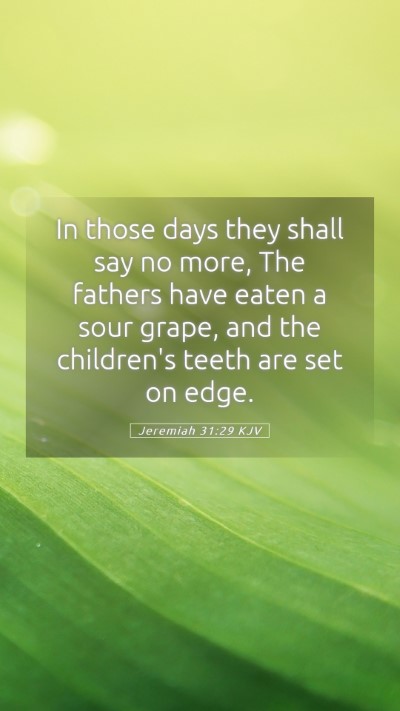Understanding Jeremiah 31:29
Jeremiah 31:29 states: "In those days they shall no more say, The fathers have eaten a sour grape, and the children’s teeth are set on edge." This verse conveys a significant shift in how individuals relate to sin and its consequences, highlighting God's plan for personal responsibility and relational dynamics.
Contextual Background
This verse emerges from a prophetic declaration by Jeremiah during a time of impending judgment and exile for Israel. It encapsulates the overarching theme of restoration and the new covenant that God promises to establish with His people. Commentators observe that the "sour grape" concept is a metaphor reflecting the generational transmission of sin and its repercussions, prevalent in ancient Israelite culture.
Bible Verse Meanings
- Generational Sin: Matthew Henry notes that the proverb quoted in the verse illustrates the common Jewish belief that children are punished for the sins of their parents. God, through Jeremiah, intends to rectify this misunderstanding.
- Personal Accountability: Albert Barnes emphasizes that each individual will bear their own guilt, signaling a shift towards personal responsibility in relationship with God.
- New Covenant Dynamics: Adam Clarke asserts that the new covenant will bring about a change in the human heart, making this proverb obsolete, as people will be accountable for their actions.
Bible Verse Interpretations
In exploring the meaning of Bible verses such as Jeremiah 31:29, various interpretations arise:
- Spiritual Restoration: The verse heralds a time when God promises a restoration of His people, indicating that this new covenant will forge a direct relationship between individuals and God.
- Hope and Redemption: This declaration points toward the hope of redemption, wherein the consequences of sin are addressed on an individual basis rather than collectively.
Bible Verse Understanding
To grasp the meaning of Scripture and the significance behind Jeremiah 31:29:
- Historical Context: Understanding the historical context is imperative. Israel had a long history of idolatry and sin, and God's promise of a new covenant brings hope amidst hopelessness.
- Application of Teachings: This verse communicates how individual hearts must respond to God’s covenant, encouraging believers to seek personal relationship and accountability.
Bible Study Insights
Engaging with scriptures like Jeremiah 31:29 enriches one’s Bible study resources and offers profound insights for Bible study groups. This verse facilitates discussions centered on:
- God's Justice and Mercy: How God balances justice with mercy in His relation to humanity.
- The Role of the Holy Spirit: In the new covenant, believers receive the Holy Spirit, who transforms hearts and minds, leading to obedience.
Biblical Exegesis
When conducting an in-depth Biblical exegesis on Jeremiah 31:29:
- Textual Analysis: Analyze the Hebrew text for deeper understanding of metaphors used.
- Comparative Study: Compare with other prophetic texts regarding personal repentance and bygone traditions.
Related Bible Verses
For a comprehensive understanding, consider examining the following related scriptures:
- Ezekiel 18:20: "The soul that sins will die. The son will not share the guilt of the father, nor will the father share the guilt of the son." This verse echoes the theme of individual responsibility.
- Hebrews 8:10-12: Discusses the new covenant and how God's laws will be written on the hearts of the people.
- Romans 14:12: "So then, each of us will give an account of ourselves to God," reinforcing personal accountability.
Conclusion
Jeremiah 31:29 encapsulates a transformative promise of God regarding the nature of accountability and relationship. By understanding this scripture, believers can appreciate the depth of God’s covenant and the personal call to respond to His grace. As you embark on your Bible study plans, let this verse serve as a reminder of God’s desire for each person to seek Him individually, understanding the rich implications of His promises.


